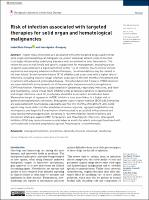| dc.contributor | Vall d'Hebron Barcelona Hospital Campus |
| dc.contributor.author | Ruiz Camps, Isabel |
| dc.contributor.author | Aguilar Company, Juan |
| dc.date.accessioned | 2021-12-03T12:57:31Z |
| dc.date.available | 2021-12-03T12:57:31Z |
| dc.date.issued | 2021-02-19 |
| dc.identifier.citation | Ruiz-Camps I, Aguilar-Company J. Risk of infection associated with targeted therapies for solid organ and hematological malignancies. Ther Adv Infect Dis. 2021 Feb 19;8:1–15. |
| dc.identifier.issn | 2049-9361 |
| dc.identifier.uri | https://hdl.handle.net/11351/6653 |
| dc.description | Checkpoint inhibitors; Everolimus; Ibrutinib |
| dc.description.abstract | Higher risks of infection are associated with some targeted drugs used to treat solid organ and hematological malignancies, and an individual patient’s risk of infection is strongly influenced by underlying diseases and concomitant or prior treatments. This review focuses on risk levels and specific suggestions for management, analyzing groups of agents associated with a significant effect on the risk of infection. Due to limited clinical experience and ongoing advances in these therapies, recommendations may be revised in the near future. Bruton tyrosine kinase (BTK) inhibitors are associated with a higher rate of infections, including invasive fungal infection, especially in the first months of treatment and in patients with advanced, pretreated disease. Phosphatidylinositol 3-kinase (PI3K) inhibitors are associated with an increased risk of Pneumocystis pneumonia and cytomegalovirus (CMV) reactivation. Venetoclax is associated with cytopenias, respiratory infections, and fever and neutropenia. Janus kinase (JAK) inhibitors may predispose patients to opportunistic and fungal infections; need for prophylaxis should be assessed on an individual basis. Mammalian target of rapamycin (mTOR) inhibitors have been linked to a higher risk of general and opportunistic infections. Breakpoint cluster region-Abelson (BCR-ABL) inhibitors are associated with neutropenia, especially over the first months of treatment. Anti-CD20 agents may cause defects in the adaptative immune response, hypogammaglobulinemia, neutropenia, and hepatitis B reactivation. Alemtuzumab is associated with profound and long-lasting immunosuppression; screening is recommended for latent infections and prevention strategies against CMV, herpesvirus, and Pneumocystis infections. Checkpoint inhibitors (CIs) may cause immune-related adverse events for which prolonged treatment with corticosteroids is needed: prophylaxis against Pneumocystis is recommended. |
| dc.language.iso | eng |
| dc.publisher | SAGE Publications |
| dc.relation.ispartofseries | Therapeutic advances in infectious disease;8 |
| dc.rights | Attribution-NonCommercial 4.0 International |
| dc.rights.uri | http://creativecommons.org/licenses/by-nc/4.0/ |
| dc.source | Scientia |
| dc.subject | Medicaments antineoplàstics |
| dc.subject | Hematologia oncològica |
| dc.subject.mesh | Hematologic Neoplasms |
| dc.subject.mesh | /therapy |
| dc.subject.mesh | Antineoplastic Agents |
| dc.subject.mesh | /adverse effects |
| dc.title | Risk of infection associated with targeted therapies for solid organ and hematological malignancies |
| dc.type | info:eu-repo/semantics/article |
| dc.identifier.doi | 10.1177/2049936121989548 |
| dc.subject.decs | antineoplásicos |
| dc.subject.decs | /efectos adversos |
| dc.subject.decs | neoplasias hematológicas |
| dc.subject.decs | /terapia |
| dc.relation.publishversion | https://doi.org/10.1177/2049936121989548 |
| dc.type.version | info:eu-repo/semantics/publishedVersion |
| dc.audience | Professionals |
| dc.contributor.organismes | Institut Català de la Salut |
| dc.contributor.authoraffiliation | [Ruiz-Camps I] Servei de Malalties Infeccioses, Vall d’Hebron Hospital Universitari, Barcelona, Spain. [Aguilar-Company J] Servei de Malalties Infeccioses; Servei d’Oncologia Mèdica, Vall d’Hebron Hospital Universitari, Barcelona, Spain |
| dc.identifier.pmid | 33680453 |
| dc.identifier.wos | 000620646700001 |
| dc.rights.accessrights | info:eu-repo/semantics/openAccess |

